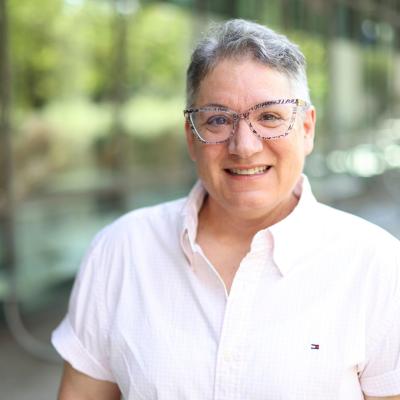
Gina M. Masullo is an Associate Professor in the School of Journalism and Associate Director of the Center for Media Engagement in the Moody College of Communication at UT Austin.
Dr. Masullo’s research focuses on how the digital space both connects and divides people and how that influences society, individuals, and journalism. They are the author of Online Incivility and Public Debate: Nasty Talk, The New Town Hall: Why We Engage Personally with Politicians, and Midlife Sapphic Revelation in the Digital Age: How Digital Media Support Coming Out Later, as well as co-editor of Scandal in a Digital Age.
Before entering academia Dr. Masullo spent 20 years as a newspaper and online reporter and editor, with most of their professional experience at The Post-Standard in Syracuse, NY. During their tenure as a journalist, they covered crime, courts, prisons, and state and local government, as well as served as an assistant city editor, bureau chief, and copy editor. Near the end of their journalistic career, they wrote and blogged about parenting and young children for the newspaper. They hold a B.A. in communication from Franciscan University of Steubenville in Ohio and an M.A. and a Ph.D. in mass communication from Syracuse University’s S.I. Newhouse School of Public Communications. Before coming to UT, they spent two years as an Assistant Professor at The University of Southern Mississippi’s School of Mass Communication and Journalism.
In their work at the grant-funded Center for Media Engagement, they conducts theoretically drive and empirically rigorous solutions to news organizations’ challenges. Currently, they are working with their CME colleagues on a connective democracy initiative, funded by the John S. and James L. Knight Foundation. The initiative seeks to develop practical solutions to the problem of societal division.
Dr. Masullo teaches a variety of undergraduate courses, including Social Media Journalism, and Online Incivility and Public Debate. They also teach graduate courses, such as Fundamentals of Statistics.
Koo, H., Lukito, J., Masullo, G.M., Overgaard, C.S.B., & Orr, B. (2025). The consequences of “the bird is free”: A computational analysis of LGBTQIA+ tweets before and after Elon Musk dismantled the platform’s moderation system. New Media & Society. Advance online publication. https://doi.org/10.1177/14614448251356240
Masullo, G.M., Kim, S., & Duchovnay, M. (2025). “Bogeyman terms”: Understanding politically conservative Americans’ folk theories about news bias. Journalism: Theory, Practice, and Criticism. Advance online publication. https://doi.org/10.1177/14648849251348330
Varma, A., Masullo, G., Limov, B., Graham, E., Sun, M., & Malik, K. (2025). “My body, my choice” versus “officials say”: Examining the effects of solidarity and monitorial reporting. Newspaper Research Journal, 46(2), 210-230. https://doi.org/10.1177/30497841251317293
Masullo, G.M. (2025). A new solution to political divisiveness: Priming a sense of common humanity through Facebook meme-like posts. New Media & Society, 27(2) 808-827. https://doi.org/10.1177/14614448231184633
Weber, I., Gonçalves, J., Masullo, G.M., Torres da Silva, M., & Hofhuis, J. (2024). Who can say what? Testing the impact of interpersonal mechanisms and gender on fairness evaluations of content moderation. Social Media + Society, 10(4), 1-15. https://doi.org/10.1177/2056305124412286702
Koo, H., Masullo, G.M., Orr, B., & Huang, Q.E. (2024). “What flipping right does a teacher have to say being [LGBTQ] is okay?” Understanding the Twitter discourse around U.S. anti-LGBTQIA+ legislation. Howard Journal of Communications. Advance online publication. https://doi.org/10.1080/10646175.2024.2421859.
Lukito, J., Chen, B., Masullo, G.M., & Stroud, N.J. (2024). Comparing a BERT classifier and a GPT classifier for detecting connective language across multiple social media. Proceedings of the Empirical Methods in Natural Language Processing Conference.
Masullo, G.M. (2023). A new solution to political divisiveness: Priming a sense of common humanity through Facebook meme-like posts. New Media & Society. Advance online publication. https://doi.org/10.1177/14614448231184633
Lu, S., Liang, H., & Masullo, G.M. (2023). Selective avoidance: Understanding how position and proportion of online incivility influence news engagement. Communication Research, 50(4), 387-409. https://doi.org/10.1177/00936502221130837
Masullo, G.M., Tenenboim, O., & Lu, S. (2023). “Toxic atmosphere effect”: Uncivil online comments taint perceptions of news outlet, audience. Journalism: Theory, Practice, and Criticism, 24(1), 101-119. https://doi.org/10.1177/14648849211064001
Masullo, G.M., Wilner, T., & Stroud, N.J. (2022). What social media could be: Normative frameworks for evaluating digital public spaces. Social Media + Society, 8(4), 1-11. https://doi.org.10.1177/20563051221130447
Masullo, G.M., Wilhelm, C., Lee, T., Gonçalves, J., Riedl, M.J., Stroud, N.J. (2022). Signaling news outlet trust in a Google Knowledge Panel: A conjoint experiment in Brazil, Germany, and the United States. New Media & Society. Advance online publication. https://doi.org/10.1177/14614448221135860
Overgaard, C.S. B., Masullo, G.M., Duchovnay, M., & Moore, C. (2022). Theorizing connective democracy: A new way to bridge political divides. Mass Communication and Society, 25(6), 861-885. https://doi.org/10.1080/15205436.2022.2119870
Masullo, G.M., & Duchovnay, M. (2022). Extending the spiral of silence: Theorizing a typology of political self-silencing. Communication Studies, 73(5-6), 607-622. https://doi.org/10.1080/1051974.2022.2129401
Masullo, G.M. (2022). Facebook reactions as heuristics: Exploring relationships between reactions and commenting frequency on news about COVID-19. First Monday, 27(8), n.p. https://doi.org/10.5210/fm.v27i8.12674
Masullo, G.M., Riedl, M.J., & Huang, Q.E. (2022). Engagement moderation: What journalists should say to improve online discussions. Journalism Practice, 16(4), 738-754. https://doi.org/10.1080/17512786.2020.1808858
Masullo, G.M., Ziegele, M., Riedl, M.J., Jost, P., & Naab, T. (2022). Effect of a high-person-centered response to commenters who disagree on readers’ positive attitudes toward a news outlet’s Facebook page. Digital Journalism, 10(3), 493-515. https://doi.org/10.1080/21670811.2021.2021376
Masullo, G.M., Shermak, J., Riedl, M.J., Brown, J., & Tenenboim, O. (2022). Online political comments: Americans talk about the election through a “horse-race” lens. Proceedings of the Digital and Social Media track of the Hawaii International Conference on System Sciences [HICSS], Hawaii, 3242-3250. http://hdl.handle.net/10125/79731
Peacock, C., Masullo, G.M., & Stroud, N.J. (2022). The effect of news labels on perceived credibility. Journalism: Theory, Practice, and Criticism, 23(2), 301-319. https://doi.org/10.1177/1464884920971522
Masullo, G.M., Tenenboim, O., & Lu, S. (2021). “Toxic atmosphere effect”: Uncivil online comments taint perceptions of news outlet, audience. Journalism: Theory, Practice, and Criticism. Advance online publication. https://doi.org/10.1177/14648849211064001
Brown, D.K., Wilner, T., & Masullo, G.M. (2021). “It’s just not the whole story”: Black perspectives on protest portrayals. Howard Journal of Communications. Advance online publication. https://doi.org/10.1080/10646175.2021.2012852
Masullo, G.M., Lee, T., & Riedl, M.J. (2021). Signaling news outlet credibility in a Google search. Journalism & Mass Communication Quarterly. Advance online publication. https://journals.sagepub.com/doi/pdf/10.1177/10776990211047964
